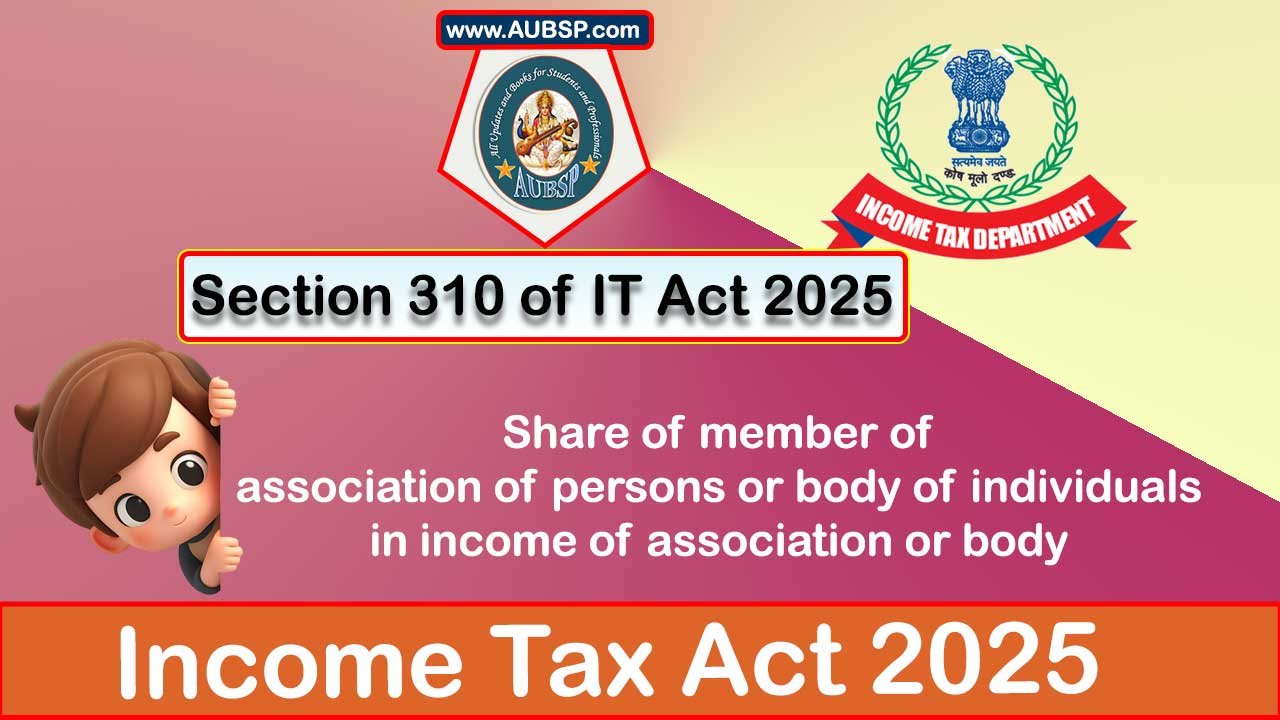Share of member of association of persons or body of individuals in income of association or body
[Section-310 as per the Income Tax Act, 2025 (this Act) w.e.f. 1st April, 2026.]
Section 310(1) of Income Tax Act 2025
310(1) Income-tax shall not be payable by an assessee (who is a member of an association of persons or body of individuals) in respect of his share in the income of the association of persons or body of individuals computed in the manner provided in section 309, except in a case referred to in sub-section (2).
Section 310(2) of Income Tax Act 2025
310(2) Where no income-tax is chargeable on the total income of the association of persons or body of individuals, the share of a member computed as aforesaid shall be chargeable to tax as part of his total income.
Section 310(3) of Income Tax Act 2025
310(3) Where no income-tax is payable by an assessee under sub-section (1),––
- (a) if the association of persons or body of individuals is chargeable to tax on its total income at the maximum marginal rate or any higher rate under any of the provisions of this Act, the share of a member computed as aforesaid shall not be included in his total income;
- (b) in any other case, the share of a member computed as aforesaid shall form part of his total income.
FAQs on Section 310 of Income Tax Act 2025
What does Section 310(1) of the Income Tax Act, 2025 state?
It provides that a member of an association of persons (AOP) or body of individuals (BOI) shall not be liable to pay income tax on their share in the income of such AOP or BOI, if the income has been computed as per Section 309, except in cases covered under sub-section (2).
When is the member’s share in an AOP or BOI taxable in the hands of the member under Section 310(2)?
If no income tax is chargeable on the total income of the AOP or BOI, then the member’s share becomes taxable in their hands as part of their total income.
What happens when the AOP or BOI is taxed at the maximum marginal rate or higher?
As per Section 310(3)(a), if the AOP or BOI is taxed at the maximum marginal rate or a higher rate under any provision of the Act, the member’s share will not be included in their total income.
What if the AOP or BOI is not taxed at the maximum marginal rate or higher?
Under Section 310(3)(b), in all cases other than those where the AOP or BOI is taxed at the maximum marginal rate or higher, the member’s share will be included in their total income.
Is a member’s share in AOP or BOI always exempt from tax in their hands?
No, it is not always exempt. It depends on whether the AOP or BOI is taxed and at what rate. If no tax is charged on the AOP/BOI’s income or if taxed at normal slab rates, the member’s share may be taxable in their hands.
What is the significance of computing income as per Section 309 for applying Section 310?
Section 310 applies only if the share of the member is computed in accordance with Section 309, which outlines the method of computing total income of an AOP or BOI.
Does Section 310 apply to all kinds of AOPs or BOIs, including those formed for business purposes?
Yes, Section 310 applies to any AOP or BOI, irrespective of the purpose of formation, as long as the member’s share is computed as per Section 309.
If the AOP or BOI has losses or is exempt from tax, will the member still be taxed?
If the AOP or BOI has no tax chargeable (e.g., due to losses or exemptions), the member’s share will be included in their total income and taxed accordingly as per Section 310(2).
Can a member claim exemption on their share if the AOP is already taxed at a high rate?
Yes, if the AOP is taxed at the maximum marginal rate or higher, the member’s share will not be taxed in their hands, as per Section 310(3)(a).
What is meant by ‘maximum marginal rate’ under Section 310?
It refers to the highest rate of income tax (including surcharge) applicable to individuals or other taxpayers under the Act.

